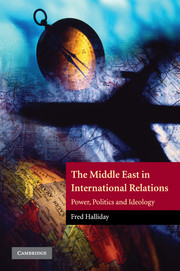Book contents
- Frontmatter
- Contents
- List of maps
- List of tables
- Acknowledgements
- Introduction: world politics, the Middle East and the complexities of area studies
- Part I Concepts, regions and states
- Part II History
- Part III Analytic issues
- 6 Military conflict: war, revolt, strategic rivalry
- 7 Modern ideologies: political and religious
- 8 Challenges to the state: transnational movements
- 9 International political economy: regional and global
- Part IV Conclusion
- Appendices
- Select bibliography
- Index
7 - Modern ideologies: political and religious
Published online by Cambridge University Press: 05 September 2012
- Frontmatter
- Contents
- List of maps
- List of tables
- Acknowledgements
- Introduction: world politics, the Middle East and the complexities of area studies
- Part I Concepts, regions and states
- Part II History
- Part III Analytic issues
- 6 Military conflict: war, revolt, strategic rivalry
- 7 Modern ideologies: political and religious
- 8 Challenges to the state: transnational movements
- 9 International political economy: regional and global
- Part IV Conclusion
- Appendices
- Select bibliography
- Index
Summary
‘How much does the future now being constructed correspond to the popular hopes of the past?’ (John Berger, 1979) Any serious discussion of ‘alternative development’ – i.e. one that seeks to go beyond technocratic social engineering – must attempt a meaningful answer to this question. It is necessary, however, to qualify that the ‘hopes’ are not really of the ‘past’. Their expression is frequently, and inextricably, laden with the values, yearnings, and images of the past; but they are intrinsically existential hopes, induced and augmented by the contemporary crisis. For example, the often publicized ideological traditionalism of Third World people (the media spoke as much about ‘resurgent’ Buddhism in the early 1960s as it does of Islam in the late 1970s) is a product of excessive, uneven ‘modernization’. In the so-called ‘transitional’ societies, one judges the present morally with reference to the past, to inherited values; but materially in relation to the future. Therein lies a new dualism in our social and political life; the inability or unwillingness to deal with it entails disillusionment, terrible costs, and possible tragedy. One mourns Cambodia, fears for Iran.
Eqbal Ahmad, Lecture, ‘From Potato Sack to Potato Mash: an Essay on the Contemporary Crisis of the Third World’, Transnational Institute, Amsterdam, April 1980.‘Agents’ and ‘plots’: values, explicit and implicit
No preconception about the Middle East is more prevalent, in east and west alike, than the idea that the politics of the region need to be seen in terms of enduring and all-explaining ‘cultural’ values.
- Type
- Chapter
- Information
- The Middle East in International RelationsPower, Politics and Ideology, pp. 193 - 228Publisher: Cambridge University PressPrint publication year: 2005

